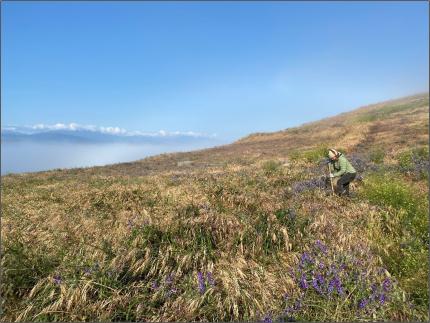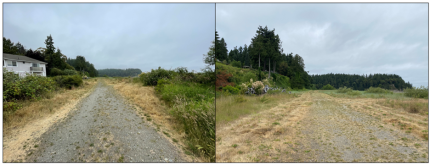Managing Wildlife Populations
Snowy Plover: Biologists Cent and Novack completed the third and final round of breeding adult snowy plover surveys with the help of various WDFW staff members. Below is a summary table of the adults observed during the three surveys (“visits”) in 2023. Numbers at Midway Beach continued to trend downward compared to prior years. Plover observations were fairly consistent at Conner Creek and Copalis Spit. Six nests were discovered at Midway Beach during survey efforts, three nests were discovered at Copalis Spit, and one at Conner Creek. Three chicks were observed in the final survey at Midway Beach. Biologist Cent will continue to monitor active nests as time allows.
|
Site |
Visit 1 |
Visit 2 |
Visit 3 |
|
Midway Beach |
10 |
14 |
12 |
|
Conner Creek |
2 |
0 |
4 |
|
Copalis Spit |
5 |
5 |
5 |
|
Oyhut Spit |
0 |
0 |
0 |
|
Ocean Shores |
0 |
0 |
0 |
Streaked Horned Lark: Biologists Cent and Novack completed the last round of lark surveys. Below is a summary table of the three surveys completed during the 2023 breeding season. After a site visit to Damon Point showed the habitat was no longer suitable for breeding larks, Biologist Cent determined the site did not need to be surveyed in 2023. The habitat at Oyhut Spit (adjacent to Damon Point) is now very marginal, which likely explains why no larks were observed this season. Numbers of larks at Shelton Airport and Midway Beach were similar to the last surveys conducted in 2018, with a slight increase at Midway.
|
Site |
Visit 1 |
Visit 2 |
Visit 3 |
|
Midway Beach |
10 |
10 |
9 |
|
Shelton Airport |
7 |
3 |
6 |
|
Oyhut Spit |
0 |
0 |
0 |
Conserving Natural Landscapes
Protection Island: Wildlife Area Manager Laushman, Prairie Specialist Cook, and Biologist Norris worked with a Sound Native Plants crew to spend time working on weed removal and dune grass transplanting on Protection Island, part of the North Olympic Wildlife Area.

McNeil Island: Wildlife Area Manager Laushman treated noxious weeds including Japanese knotweed and tansy ragwort on McNeil Island.
Irondale Beach: The Water Access team assisted Wildlife Area Manager Laushman in cutting overgrown vegetation around the parking and trails at Irondale Beach, of the Chimacum Unit, and refreshed signage.

Irondale Beach: The Water Access team assisted Wildlife Area Manager Laushman in cutting overgrown vegetation around the parking and trails and refreshed signage at Irondale Beach, of the Chimacum Unit.
Lands 20/20: Biologist Novack submitted an initial draft proposal for land acquisitions along the Chehalis River Valley in Grays Harbor County.
National Association of Clean Water Act (NACWA) Grant: Biologist Novack provided review and support to partners with Ducks Unlimited for their application for federal funding from NACWA. WDFW is providing match dollars from property acquisitions that have already occurred or are funded for the next fiscal biennium. The grant proposes to undertake wetland enhancement and restoration actions on public and private lands within Thurston and Grays Harbor counties.
Conducting Business Operations and Policy
Customer Service: Biologist Novack has handled several questions from hunters after the permit draw results were posted.
McNeil Island: Wildlife Area Manager and Assistant Regional Wildlife Program Manager Blankenship attended the quarterly McNeil interagency meeting to facilitate coordination and planning on the island.